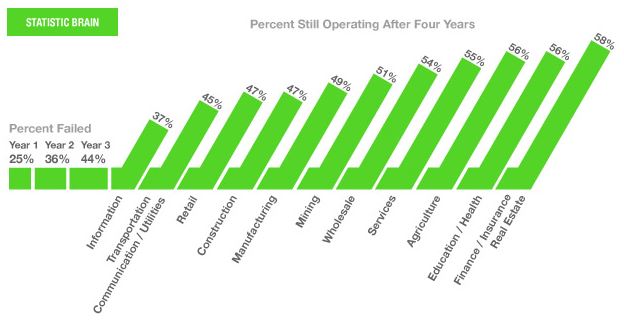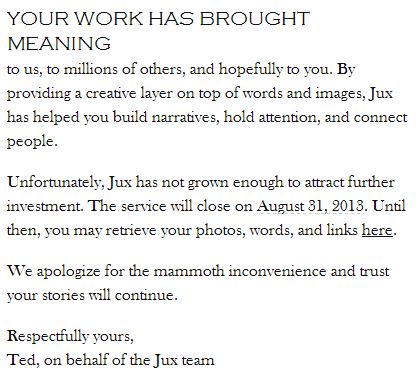Meaning and narrative: Jux closes and exposes the truth behind the consumer exchange

Social media site Jux is shutting down. I am not surprised. The image-focused blogging platform was aesthetically engaging, but perhaps not differentiated from image-heavy WordPress themes or Tumblr. The potential I saw in my October 2012 review of social media sites was unfortunately not realised. Since August 2011, their page views grew from 247k to 7.6m and the number of posts grew from 6.6k to 90k but it was not enough to support continued funding.

The story is a sad yet common reality of the technology start-up hype. Information technology has the potential to escalate people to riches, but the relative ease of access into the technology space also awards it the highest failure rate among new enterprises. Statistically only 37 % of information start-ups exist in some form after their fourth year.

Statistics rarely dissuade those so inclined to put their hat in the game. While reasons for building and running companies may vary by industry, a 2009 survey by the Kaufmann Foundation found the reasons why entrepreneurs start things include:
- Desire to build wealth (74.8%)
- Capitalise on a business idea (68.1%)
- Appeal of the start up culture (66.2%)
- Always wanted their own companies (64.2%)
- Working for others did not appeal (60.3%)
Elements that are less of a factor are developing a technology to commercialise (18.1%) and inability to find traditional employment (4.5%).
The organisation / consumer exchange

The parting email I received from Jux highlights another element that may play a part in the reasons why people start organisations. In big, bold words across the top of the email, Ted from Jux said “YOUR WORK HAS BROUGHT MEANING TO US”. In return, Ted says that Jux gave their customers the ability to “build narratives, hold attention, and connect people”.
In this simple email, Jux shows they understand a powerful exchange that happens in every consumer transaction. We as consumers give meaning to organisations that provide product and services. In response, organisations reinforce the consumer’s story they tell about themselves, provide something on which the customer can focus, and provide a community around common consumption practices.
Consumers give organisations meaning
Think about any product or service that is offered: pizza, counselling, newspapers, insurance, religion, public transportation, or public legislation. If no one consumes these products and services, then the expression is deemed meaningless by the market.
Meaning is defined by the response of those consuming what we have to offer. I have touched on this in the past with thoughts on symbolic interactionism, where what a thing means depends on our assessment of what others think or act towards that thing. This can also be seen in the new MySpace being defined by those aspiring to position themselves as celebrities, or how Foursquare is meaningless if people do not find value in what it has to offer.
You may think you have the best product or service in the world. If you cannot get people to consume it, it may lose its meaning.
Organisations help consumers with narrative, distraction, and community
The Jux email also exposes what customers receive in exchange for providing meaning to organisations. In return for giving the company meaning, we 1) build our narratives, 2) hold attention, and 3) connect people. Each of these three things has significant value.
1) Build narratives
We build narratives for ourselves through the consumption of services of others and then reflect on that consumption. We consume a football game and attach our identity to our team. People who wear brands such as Abercrombie & Fitch align their identity with narrative portrayed by the company (which is proving less than meaningful for the brand). Organisations select a certain type of company as a supplier, such as “enterprise level”, “low cost”, or “ethical”, to reflect the values and desired market position of the purchaser.
Every transaction we make reinforces the story we tell about ourselves: that we are frugal or extravagant, fashion-conscious or fashion-ignorant, healthy or nutritionally ambivalent. Our personal story-telling carries through to our online transactions, and I don’t just mean online purchases. Every click and subscription constitutes a transaction in a world defined and rewarded by consumer eyes on page.
2) Hold attention
We are a distracted people. We cry that we are time-poor, yet society continues to churn out distractions at a blistering pace. Social and traditional media compete for our attention as a tradable commodity and we eagerly yearn for a winner so as to momentarily rest our short attention spans.
This is an unfortunate paradox, in that the thing that holds our attention is likely a distraction from focusing on that which will give us meaning. The consumption that provides meaning for the supplier may provide an artificial meaning for the consumer. That is unless we use the consumption process to…
3) Connect people
I came cross research in my My Pizza Personality research that highlighted the reinforcing nature of community on brand engagement. If you want people to engage consistently with your brand, create communities around the engagement. This can be seen in any product or service, be it sports teams, clothing lines, food franchises, or religious institutions.
Even now, I go to the Jux site and on the front someone has posted an image of the hash tag #saveJux. People connect around the product in which they define their story and the consumption behaviour that holds their collective attention.
Jux: Make things meaningful

Jux may not have hit the mark in a very crowded technology space. They did, however, capture the essence of what so many are searching for in the consumer exchange.
Organisations are desperately competing, not for consumer favour, but to assure themselves that what they do as a service or product provider has meaning. Consumers are satisfying this need in their search to reinforce their story, find distractions, and connect with people in a meaningful way.
With Jux no longer available, we will now need to search elsewhere for a way to “Make things meaningful”. Or perhaps we might momentarily pause our search for distractions, re-assess the story we create for ourselves, and truly connect with other people outside of the consumption framework. In doing so, perhaps we might begin to instead make life meaningful.

We are lots of happy Jux users, only 63 signed so far, but I’m trying to collect signatures to stop the closing if that is possible:
http://www.change.org/en-GB/petitions/jux-stop-the-closing-of-the-blogging-platform-jux-com
Good luck, Marina!